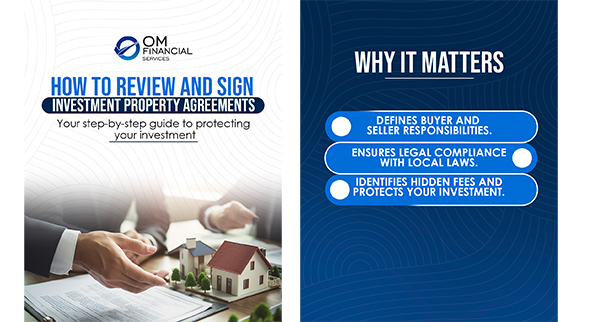


The process involves reviewing and signing investment property agreements.
Investment property agreements are at the heart of any buying process. The Australian investor can ensure his financial security and peace of mind by reviewing and signing such documents. Whether one is a seasoned investor or just starting fresh in the property market, paying excellent attention to details will protect one's interest and make the investment journey much more smooth.
Why Investment Property Agreement Reviews are Important
An investment property agreement review is not only a formality for signature but an important legal contract that defines the terms of the deal. Any mistakes made at this stage might turn into unexpected problems or financial losses. Let's now see why this step is an important one for all investors.
Clearly defining responsibilities
Property agreements outline the obligations of both the buyer and the seller. By reviewing these documents again, you can clarify your responsibilities to prevent future disputes.
Ensuring Legal Compliance
The property laws in Australia are rigid yet different from state to state. Carefully reading through your agreement helps you follow the local laws and regulations and avoid possible legal disputes.
Avoid financial surprises
Unpredictable costs can be in the form of hidden fees or penalties that eat into your profits. A thorough review highlights any clauses that could potentially lead to additional expenses.
Protecting Your Investment
You can, therefore, negotiate better terms or reconsider some deals that may not be serving your financial goals simply by identifying potential risks.
Sealing Your Rights
The transaction should protect your interests as an investor. Scrutiny ensures that the clauses regarding dispute resolution or default are fair and clear-cut.
How to Review an Investment Property Agreement
The review of an agreement may be a daunting task, but if broken down into clear and manageable steps, it's easier. Here is a step-by-step guide.
2. Financial Clauses
Understanding the financial aspects is paramount in trying to avoid any unexpected costs or disputes later.
3.Legal Terms Review
Legal clauses carry big words and terms one may often overlook. Pay closer attention to the following sections:
4. Take professional assistance from experts
Professional advice can underline a lot of issues that you might fail to see yourself.
What to Do Before Signing
Once you’ve reviewed the document, there are still some final steps to take before you put pen to paper.
Negotiate terms if necessary
If you spot any clauses that seem unfair or unclear, negotiate with the seller or their representative. Amendments can be made before signing.
Double-Check Deadlines
Ensure that the timelines for deposits, inspections, and settlements align with your ability to meet them. Missing deadlines could void the contract or incur penalties.
Understand the Full Agreement
Don’t sign anything unless you understand every part of the agreement. Ask questions if needed, especially about complex legal or financial terms.
Confirm the final changes
Make sure to accurately note any changes in this final version. Even minor mistakes can become major problems.
Have a witness present
An agreement may occasionally require signatures in front of a witness or notary. Check to see if this is a requirement to avoid hang-ups.
Common Mistakes to Avoid
Even the most meticulous investors can make mistakes during this process. Here are some pitfalls to watch out for:
Relying totally on a verbal agreement
Always make sure that everything that has been negotiated becomes part of the written contract. Verbal agreements are not legally binding.
Skipping the Small Clauses
Even the smallest clauses sometimes present pitfalls. Read the entire contract, no matter how unimportant it may seem.
Lack of Professional Advice
Perhaps skipping a professional review saves some time and expense, but precious little compared with what a lawsuit can cost later on.
Singing under pressure
Never let anyone rush you into signing; take the time required to review properly.
Not anticipating future risks
Consider how the terms may affect you over time, regarding restrictions on how you use your property and liability.
FAQs
Conclusion
Signing a property investment agreement is one of the most critical stages. Australian investors have to go through. If you scrutinize the document well, understand what it says, and, where necessary, consult experts, you will be able to protect your interests and comfortably make prudent decisions. Keep in mind that the more time you invest in this process now, the fewer costly mistakes you will have to bear later on. To learn more about getting a mortgage with OM Financials, check our services page. For property investment legislation specific to Australia, check out the Australian Taxation Office.
Need personalized advice? Book a call with OM Financials today, and let us help you make informed financial decisions for your property investment journey.
17 Dec 2024, 12:00 AM
16 Dec 2024, 12:00 AM
14 Dec 2024, 12:00 AM
12 Dec 2024, 12:00 AM
10 Dec 2024, 12:00 AM